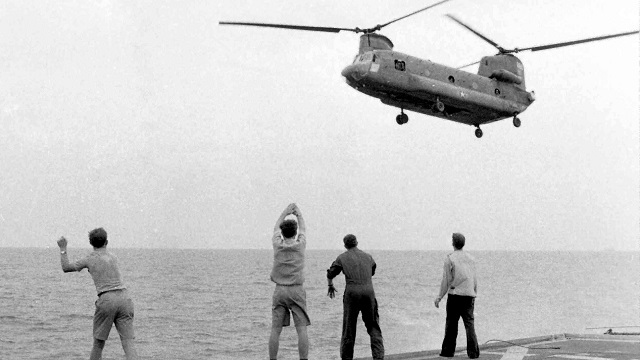Can something be a great documentary… and a so-so film? And is a documentary that’s a great film necessarily a successful documentary? Those are two questions that anyone who watches a lot of documentaries has to deal with at some point, I think. Does the positive message of A Place at the Table outweigh the pedestrian presentation? Is Leviathan a poetic masterpiece or well-shot fluff?
It’s something I wrestled with frequently during Rory Kennedy’s Last Days in Vietnam, a film that debuted at Sundance earlier this year and was released in select theaters beginning this weekend. Kennedy’s film starts after the American part of the Vietnam War was basically over, opening after the Paris Peace Accords were signed, and the vast bulk of the movie is dedicated to the last handful of days there was any American presence in Saigon. It was an incredibly hectic time, full of powerful emotions as stubbornness gave way to full-on panic. Kennedy’s document dug up some amazing footage from those final days, supplemented by testimony from a handful of officers and civilians who managed to escape.
It is also, to put it politely, incredibly dry. It’s a film made by an archivist.
But is that necessarily a bad thing? Is the power of the presentation more important than the power of the material? As I mentioned above, Last Days in Vietnam definitely isn’t lacking when it comes to finding some fairly staggering archival material. It has what on paper seems to be a perfect recipe for a great documentary: A fantastic story few people have heard, first-hand accounts from men on the ground, and the audio-visual material to back it all up. The editing is solid, the heroics are real, the details are there. And yet, I left unsatisfied.
What separates it from, say, a really excellent web profile? From a book, or a podcast? A medium other than film might allow it to branch out a bit and offer more background, after all, particularly in the (very) rare moments when it focuses on Vietnamese citizens. As a film, Last Days in Vietnam is visually undistinguished and marked by a languid pace that finds the film backloaded with interesting material in a way that a less straight-forward presentation (chapters, serialization, anything) may have avoided. It makes watching the documentary frustrating – there’s enough excellent material to recommend it, but I’d be lying if I claimed the film stuck with me in a meaningful way.
But then, if Last Days in Vietnam is more an act of journalism than filmmaking, is it fair to judge it as a film? Why am I more generous with a piece of investigative journalism on Frontline – like their superb “United States of Secrets” – than I am with a feature-length film constructed similarly? The visual language between film and television is different, commercial breaks allowing TV journalists to break their presentation into punctuated chunks, and the projects are typically more immediate, but are the differences really that large? Or is it merely expectations?
Admittedly, it is, on one level, largely down to personal preference and expectation. For fans of American military history or the Vietnam War, Last Days in Vietnam is essential viewing, digging up gripping footage and finding solid interview subjects. And, hell, you know what, even if that isn’t your preferred period of American history, it’s still an interesting one, and the stories Kennedy finds – particularly the impossibly complex personal narrative of Graham Martin – are pretty killer. It very well may be that I’m simply a bit prejudiced against historical documentaries, which are inherently limited in the material they have to work with. If you watch a doc to learn something and you have an interest in the material, it’s one you can’t miss.
But if you watch a doc to watch a film… that’s something different, I think. The standards shift, and simply learning something isn’t enough. As someone who came to documentaries through Barbara Kopple, Errol Morris, and Alain Resnais, I crave more than knowledge; I, cliche that I am, want what Werner Herzog calls ‘ecstatic truth’, that deeply felt realization that, in his own words, “is mysterious and elusive, and can be reached only through fabrication and imagination and stylization.”
I like learning things. I like human interest stories. I like history. I like Last Days in Vietnam.
But I love the gut-punch feeling of arriving at a Truth, far more than I like being told the truth.


